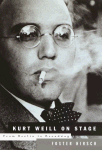|
|
 |
|
|
 |
|
|
 |
 |
 |

|
Oh, the shark has pretty teeth, dear,
And he shows them pearly white.
Just a jackknife has Macheath, dear,
And he keeps it out of sight.
The words are by Bertolt Brecht. The music is by Kurt Weill. The song is “Mack the Knife,” the number-one song of Weill’s internationally famous Threepenny Opera, originally performed on a stage in the Weimar Berlin of 1928. Its tough, sexy sound became, a quarter-century later, a signature song of America’s greatest recording stars, among them Ella Fitzgerald and Frank Sinatra.
And when in 1933 Weill, already Germany’s most renowned composer, fled the Nazis to come to America (“For every age there is a place about which fantasies are written. In Mozart’s time it was Turkey. For Shakespeare, it was Italy. For us in Germany, it was always America”), he joined his appetite for the United States to his European roots and classical training and soon became one of the most admired composers of the American musical stage.
He wrote one successful Broadway show after another—Lady in the Dark, Knickerbocker Holiday, One Touch of Venus, Street Scene, Lost in the Stars, among others. He worked with such theatrical greats as Gertrude Lawrence, Ira Gershwin, Maxwell Anderson, Mary Martin, Agnes de Mille, Joshua Logan, Ogden Nash, Harold Clurman, Walter Huston, E. Y. Harburg, and Elia Kazan. Always at the center of his life was his great love of thirty years, his leading lady, interpreter of his music, his wife (they were divorced in Berlin in 1933 but remarried four years later in America), the actress-singer Lotte Lenya.
Foster Hirsch, using Weill’s letters, journals, and notes, and interviewing Weill’s friends and colleagues, writes about his life, his experimental, political composing in Germany, his Broadway music in America—both aspects of his work being a source of controversy among music lovers for years. Lotte Lenya said, “There is no American Weill, there is no German Weill. There is no difference between them. There is only Weill.” Hirsch details the writing, casting, and production of Weill’s eleven hit shows. He writes about Weill’s years in Hollywood and the friends he made and lost along the way. He evokes Weill’s complicated, intense collaborations with Brecht, Maxwell Anderson, Langston Hughes, Alan Jay Lerner, Elmer Rice, Moss Hart, and Ira Gershwin.
In Kurt Weill on Stage, Hirsch has given us a vivid portrayal of a remarkable artist and a fabulous era of American musical theater.
|
|
 |
|
|
|
